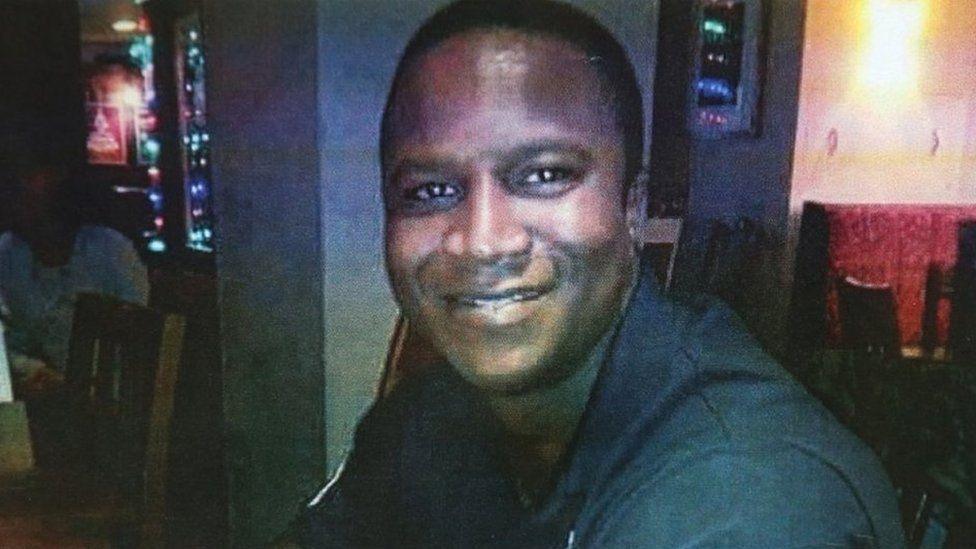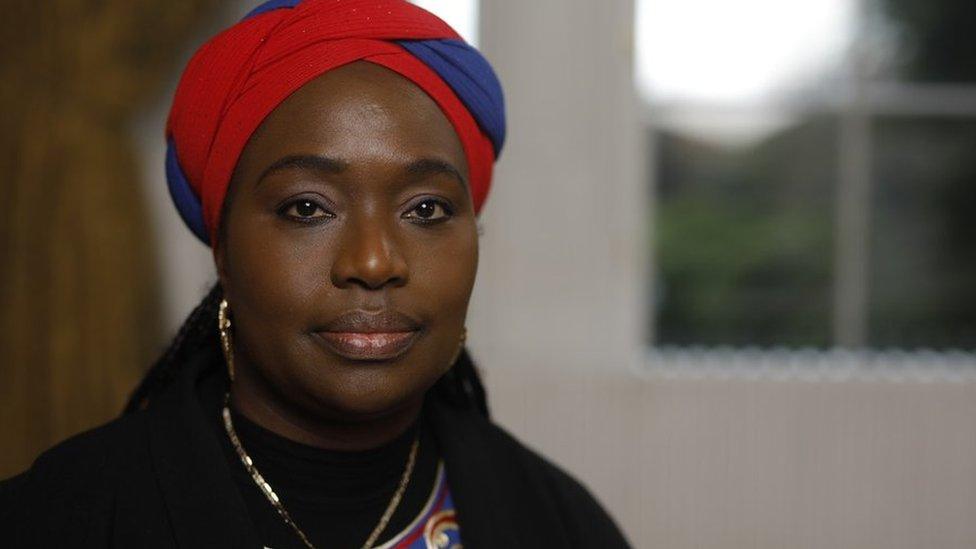Sheku Bayoh family walk out of inquiry over delay to police evidence
- Published

Sheku Bayoh died in police custody in 2015
Members of Sheku Bayoh's family staged a walkout at the public inquiry into his death, over the postponement of evidence from a police officer.
It brought the Edinburgh hearing to a temporary halt, with the family saying they were being treated unfairly.
Pre-recorded testimony was due to be heard from witness PC Alan Paton.
The former officer was one of the first at the scene after Mr Bayoh was seen carrying a knife and behaving erratically in Kirkcaldy in May 2015.
The 31-year-old was unarmed when officers found him but a violent confrontation followed. He died after being restrained on the ground by six officers, including Mr Paton.
The questioning of Mr Paton had been taped in a closed hearing for medical reasons.
Inquiry chair Lord Bracadale said that Mr Paton's lawyer had "made representations about the conditions in which the tape would be played".
He said he needed to consider this and decided to postpone the playing of the evidence until a later date.

Kadi Johnson, Sheku Bayoh's sister, walked out of the inquiry in Edinburgh
Lord Bracadale said: "I acknowledge that the late change may cause inconvenience to members of the public who wanted to watch the evidence, but sometimes changes do have to be made at short notice."
Mr Bayoh's sisters Kadi Johnson and Kosna Bayoh walked out of the inquiry room and the hearing was adjourned.
Ms Johnson said: "We are so upset. We came here today to hear his evidence. We feel he has special treatment over everybody else, and we are asking, why is that?
"They promised us that we would be at the centre of this but at the moment we are not feeling like that. We have waited seven years. Why should we wait any longer?"
The hearing later resumed with evidence from forensic scientist Paul Ryder, who was asked by the inquiry to examine the boots Mr Bayoh was wearing on the day of the incident and a high-vis vest worn by PC Nicole Short.
The inquiry's heard contested allegations that Mr Bayoh stamped on PC Short after punching her to the ground.
Mr Ryder compared the tread on Mr Bayoh's boots to small black marks on PC Short's vest, but said the marks were too poorly defined for any meaningful comparison.
In his report he said: "No features were present ... that I would expect to see if they were related to an item of footwear being brought down in forceful contact with this vest."
Questioned by a lawyer representing two of the officers, Mr Ryder agreed he could not rule out the possibility that the marks had been caused by Mr Bayoh's footwear.
But he added: "If the entirety of that mark was a single contact with that boot, what I'm seeing isn't what I would expect to see."
Professor Lorna Dawson from the James Hutton Institute in Aberdeen examined three soil marks on PC Short's vest with soil found on Mr Bayoh's boots.
She said two of the soil marks on the vest were "consistent" with having come from Mr Bayoh's footwear.
The inquiry junior counsel Lorna Thomson asked: "Members of the public watching the evidence might wonder whether you are saying that the soil on areas one and three on the vest did come from Sheku Bayoh's boots, is that what you are saying?"
Prof Dawson replied: "I think we are saying that it's consistent with having come from there. We can't categorically say that it came from Mr Bayoh's boots."